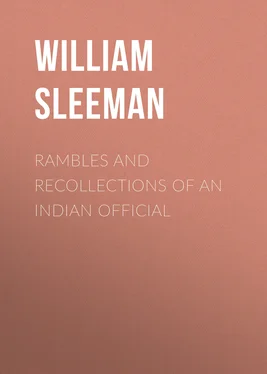William Sleeman - Rambles and Recollections of an Indian Official
Здесь есть возможность читать онлайн «William Sleeman - Rambles and Recollections of an Indian Official» — ознакомительный отрывок электронной книги совершенно бесплатно, а после прочтения отрывка купить полную версию. В некоторых случаях можно слушать аудио, скачать через торрент в формате fb2 и присутствует краткое содержание. Жанр: Путешествия и география, История, foreign_edu, foreign_antique, foreign_prose, на английском языке. Описание произведения, (предисловие) а так же отзывы посетителей доступны на портале библиотеки ЛибКат.
- Название:Rambles and Recollections of an Indian Official
- Автор:
- Жанр:
- Год:неизвестен
- ISBN:нет данных
- Рейтинг книги:4 / 5. Голосов: 1
-
Избранное:Добавить в избранное
- Отзывы:
-
Ваша оценка:
- 80
- 1
- 2
- 3
- 4
- 5
Rambles and Recollections of an Indian Official: краткое содержание, описание и аннотация
Предлагаем к чтению аннотацию, описание, краткое содержание или предисловие (зависит от того, что написал сам автор книги «Rambles and Recollections of an Indian Official»). Если вы не нашли необходимую информацию о книге — напишите в комментариях, мы постараемся отыскать её.
Rambles and Recollections of an Indian Official — читать онлайн ознакомительный отрывок
Ниже представлен текст книги, разбитый по страницам. Система сохранения места последней прочитанной страницы, позволяет с удобством читать онлайн бесплатно книгу «Rambles and Recollections of an Indian Official», без необходимости каждый раз заново искать на чём Вы остановились. Поставьте закладку, и сможете в любой момент перейти на страницу, на которой закончили чтение.
Интервал:
Закладка:
Any Englishman can easily conceive a poet in his highest 'calenture of the brain' addressing the ocean as 'a steed that knows his rider', and patting the crested billow as his flowing mane; but he must come to India to understand how every individual of a whole community of many millions can address a fine river as a living being, a sovereign princess, who hears and understands all they say, and exercises a kind of local superintendence over their affairs, without a single temple in which her image is worshipped, or a single priest to profit by the delusion. As in the case of the Ganges, it is the river itself to whom they address themselves, and not to any deity residing in it, or presiding over it: the stream itself is the deity which fills their imaginations, and receives their homage.
Among the Romans and ancient Persians rivers were propitiated by sacrifices. When Vitellius crossed the Euphrates with the Roman legions to put Tiridates on the throne of Armenia, they propitiated the river according to the rites of their country by the suovetaurilia , the sacrifice of the hog, the ram, and the bull. Tiridates did the same by the sacrifice of a horse. Tacitus does not mention the river god , but the river itself , as propitiated (see [ Annals ,] book vi, chap. 37). 42 42 'Sacrificantibus, cum hic more Romano suovetaurilia daret, ille equum placando amni adornasset.'
Plato makes Socrates condemn Homer for making Achilles behave disrespectfully towards the river Xanthus, though acknowledged to be a divinity, in offering to fight him, 43 43 μέγας ποταμòς βαθυδίνης, δυ Ξάνθον καλέουσι θεοί, άνδρες δè Σκάμανδρον. — Iliad xx, 73.
and towards the river Sperchius, another acknowledged god, in presenting to the dead body of Patroclus the locks of his hair which he had promised to that river. 44 44 Iliad xxiii. 140-153.
The Sōn river, which rises near the source of the Nerbudda on the tableland of Amarkantak, takes a westerly course for some miles, and then turns off suddenly to the east, and is joined by the little stream of the Johilā before it descends the great cascade; and hence the poets have created this fiction, which the mass of the population receive as divine revelation. The statue of little Johilā, the barber's daughter, in stone, stands in the temple of the goddess Nerbudda at Amarkantak, bound in chains. 45 45 Mr. Crooke observes that the binding was intended to prevent the object of worship from deserting her shrine or possibly doing mischief elsewhere, and refers to his article, 'The Binding of a God, a Study of the Basis of Idolatry', in Folklore , vol. viii (1897), p.134. The name is spelt Johillā in I.G. (1908), s.v. Sōn River.
It may here be remarked that the first overtures in India must always be made through the medium of the barber, whether they be from the prince or the peasant. 46 46 Monier Williams denies the barber's monopoly of match-making. 'In some parts of Northern India the match-maker for some castes is the family barber; but for the higher castes he is more generally a Brahman, who goes about from one house to another till he discovers a baby-girl of suitable rank' (Religious Thought and Life in India , p. 377). So far as the editor knows, the barber is ordinarily employed in Northern India.
If a sovereign prince sends proposals to a sovereign princess, they must be conveyed through the medium of the barber, or they will never be considered as done in due form, as likely to prove propitious. The prince will, of course, send some relation or high functionary with him; but in all the credentials the barber must be named as the principal functionary. Hence it was that Her Majesty was supposed to have sent a barber's daughter to meet her husband.
The 'Mahātam' (greatness or holiness) of the Ganges is said, as I have already stated, to be on the wane, and not likely to endure sixty years longer; while that of the Nerbudda is on the increase, and in sixty years is entirely to supersede the sanctity of her sister. If the valley of the Nerbudda should continue for sixty years longer under such a government as it has enjoyed since we took possession of it in 1817, 47 47 During the operations against the Pindhārī freebooters. Many treaties were negotiated with the Peshwa and other native powers in the years 1817 and 1818.
it may become infinitely more rich, more populous, and more beautiful than that of the Nile ever was; and, if the Hindoos there continue, as I hope they will, to acquire wealth and honour under a rule to which they are so much attached, the prophecy may be realized in as far as the increase of honour paid to the Nerbudda is concerned. But I know no ground to expect that the reverence 48 48 The word in the text is 'revenue'.
paid to the Ganges will diminish, unless education and the concentration of capital in manufactures should work an important change in the religious feelings and opinions of the people along the course of that river; although this, it must be admitted, is a consummation which may be looked for more speedily on the banks of the Ganges than on those of a stream like the Nerbudda, which is neither navigable at present nor, in my opinion, capable of being rendered so. Commerce and manufactures, and the concentration of capital in the maintenance of the new communities employed in them, will, I think, be the great media through which this change will be chiefly effected; and they are always more likely to follow the course of rivers that are navigable than that of rivers which are not. 49 49 Concerning the prophecy that the sanctity of the Ganges will cease in 1895, see note to Chapter 1, ante , [13]. The prophecy was much talked of some years ago, but the reverence for the Ganges continues undiminished, while the development of commerce and manufactures has not affected, the religious feelings and opinions of the people. Railways, in fact, facilitate pilgrimages and increase their popularity. The course of commerce now follows the line of rail, not the navigable rivers. The author, when writing this book, evidently never contemplated the possibility of railway construction in India. Later in life, in 1852, he fully appreciated the value of the new means of communication ( Journey , ii, 370, &c.).
CHAPTER 4
50 50 Satī , a virtuous woman, especially one who burns herself with her husband. The word, in common usage, is transferred to the sacrifice of the woman.on the Nerbudda
We took a ride one evening to Gopālpur, a small village situated on the same bank of the Nerbudda, about three miles up from Bherāghāt. On our way we met a party of women and girls coming to the fair. Their legs were uncovered half-way up the thigh; but, as we passed, they all carefully covered up their faces. 'Good God!' exclaimed one of the ladies, 'how can these people be so very indecent?' They thought it, no doubt, equally extraordinary that she should have her face uncovered, while she so carefully concealed her legs; for they were really all modest peasantry, going from the village to bathe in the holy stream. 51 51 The women of Bundēlkhand wear the same costume, a full loin-cloth, as those of the Jubbulpore district. North of the Jumna an ordinary petticoat is generally worn.
Here there are some very pretty temples, built for the most part to the memory of widows who have burned themselves with the remains of their husbands, and upon the very spot where they committed themselves to the flames. There was one which had been recently raised over the ashes of one of the most extraordinary old ladies that I have ever seen, who burned herself in my presence in 1829. I prohibited the building of any temple upon the spot, but my successor in the civil charge of the district, Major Low, was never, I believe, made acquainted with the prohibition nor with the progress of the work; which therefore went on to completion in my absence. As suttees are now prohibited in our dominions 52 52 Suttee was prohibited during the administration of Lord William Bentinck by the Bengal Regulation xvii, dated 4th December, 1829, extended in 1830 to Madras and Bombay. The advocates of the practice unsuccessfully appealed to the Privy Council. Several European officers defended the custom. A well-written account of the suttee legislation is given in Mr. D. Boulger's work on Lord William Bentinck in the 'Rulers of India' series.
and cannot be often seen or described by Europeans, I shall here relate the circumstances of this as they were recorded by me at the time, and the reader may rely upon the truth of the whole tale.
Интервал:
Закладка:
Похожие книги на «Rambles and Recollections of an Indian Official»
Представляем Вашему вниманию похожие книги на «Rambles and Recollections of an Indian Official» списком для выбора. Мы отобрали схожую по названию и смыслу литературу в надежде предоставить читателям больше вариантов отыскать новые, интересные, ещё непрочитанные произведения.
Обсуждение, отзывы о книге «Rambles and Recollections of an Indian Official» и просто собственные мнения читателей. Оставьте ваши комментарии, напишите, что Вы думаете о произведении, его смысле или главных героях. Укажите что конкретно понравилось, а что нет, и почему Вы так считаете.












